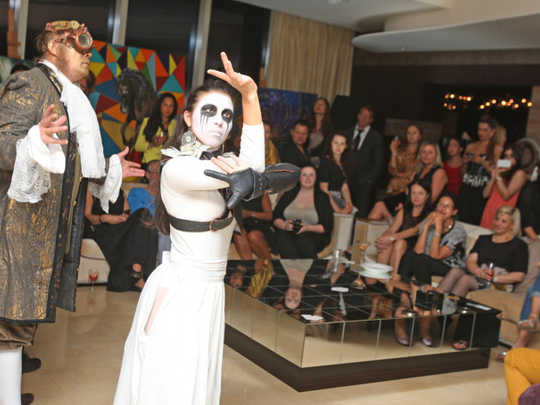
It’s unlike anything you’re ever likely to see under the category ‘pantomime’.
Alexey Chernov’s Mirror for the Soul smashes together elements of Camus-esque absurdism, James Thierree-like circus performance, unconscious imagery and street-dance-cum-Russian ballet to refract, tantalise and haunt audiences with memories of a bygone life permeated with grey-gradient nostalgia and regret.
“This is not pantomime in the purest sense,” Chernov, in all his wispy-sideburned professorial pomp tells tabloid! in an interview before a press demo of the Alterum Theatre production at the swanky Le Reve in the Dubai Marina.
“It is many different types and forms of art coming together to create a new style of fairy tale.”
Be warned: this is not a fairy tale reminiscent of Hansel and Gretel or Goldilocks: there will be no jovial audience sing-a-longs in this Russian “theatre of speechless movement,” as Chernov refers to it.
Mirror tells the story of Person in the Mask’s (the protagonist, played by Chernov) internalised journey through his memories after he finds himself in the attic of the house of his birth.
In the attic, which also serves as a meta-psychological space, he finds pictures, a letter and a mirror that evoke memories of his childhood. His recollections frantically spill over onto the stage in the form of seven other grotesquely attired actor-dancers.
Each figure represents a shade of the Self, and their contortionist, classical body-pop and street modes of dance visualise internal conflicts that strike deep into the repentant soul.
The disjointed narrative is told through an array of dance forms and eccentric mime choreographed to a blend of psychedelic, ambiance and techno music, on a darkened theatre stage.
The struggle over a bow-and-arrow is one of the high points of the production’s lofty symbolism. Loss, love, angst and disturbing nostalgia scream out at the audience through the macabre, surreal setting.
“It’s a step into a wonderland where he [Person in the Mask] is not sure whether he is in a dream or in reality,” Chernov says through an interpreter.
Though it may be labelled obscure, this is not a bad thing, the director-actor insists.
“Most people [that have already seen the show in Russia] see the production as me — as my memories and thoughts and dreams. But this is not just it: the style is abnormal and because of this the audience puts themselves on the stage with the characters.”
Mirror’s unique style envisions a symbiotic audience experience: they are forced to invest part of their psyche in the action; whether that’s with the seven-foot harlequin or the gothic ballet-meets-body popping female dancer whose eyes appear to bleed black fluid, is up to subjective interpretation.
Chernov’s theatrical intentions bespeak of an idealised democratic process that is not always, if ever, associated, with his Russian motherland. Much of his thinking behind opening up traditional form came from the collapse of the heavily-structured and controlled Soviet Union, he says.
“In the Soviet days this form of theatre would not have been possible. When we got more freedom and were able to travel and see new things from abroad it opened up new possibilities,” he says.
Though Mirror is a highly subjective experience, there is a heavy Sisyphean struggle to the action. The infuriating inevitability that the punished Corinthian King’s boulder would roll down the hill every time he tried to roll it up is an apt analogy for the ineluctability that the characters of Mirror cannot change the past.
The macabre aesthetic is also important, Chernov adds. “It’s my whole generation. It’s how I see life. It’s not a bad thing. But simply, without darkness you cannot see the light.
“If you see only white and light, there would be nothing in the shadows: which is not the case. All of us live in the light of day and the darkness of the night, in the black and white stripes of the world.”
Jenny Xtravaganza, one of the Mirror cast, told tabloid! the show is about asking questions and seizing the moment. “For some it’s a cool show with a lot of tricks. And for others who try to understand it, there’s a very deep idea behind it.
“For me, it’s like, as people get older, they try to understand their life and ask: What have I done? What I didn’t do? What was right? What was wrong? You have to go inside yourself to understand that you can’t do anything more now. So the message is do everything now.”
Mirror for the Soul runs from May 1 to 3 with three shows daily at the Madinat Theatre, Dubai. Ticket prices range between Dh50 and Dh150 and are available on platinumlist.ae.











